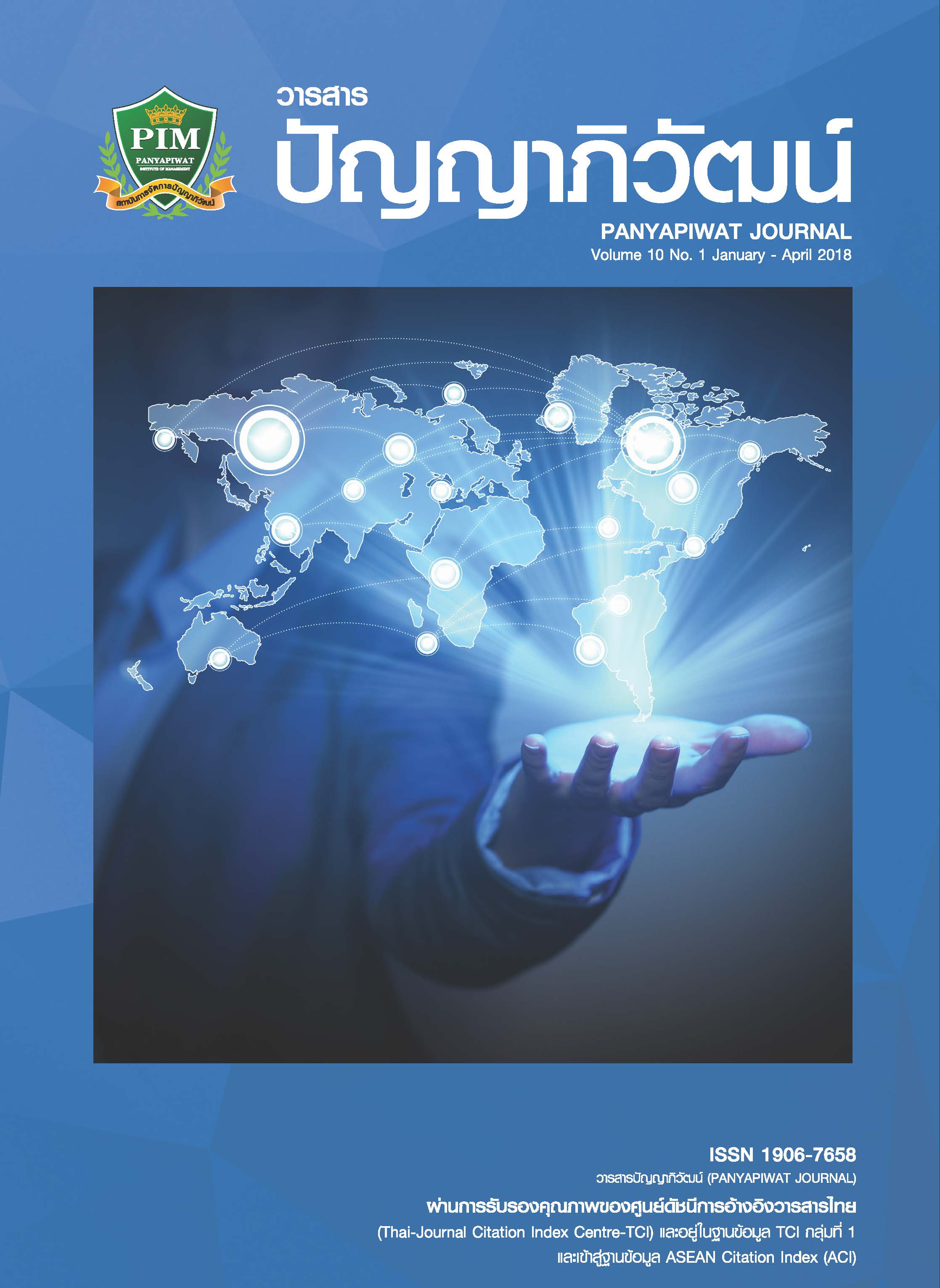English as a global language and integrating in English language teaching.
Main Article Content
บทคัดย่อ
This article aims to review the history of English and its evolution of English until it has become the English language used in the present. In addition, it aims to share how English belongs to those who speak English as a mother tongue, second language or foreign language. Originally, English has sprit out from Germanic dialect and it was spreaded into the other countries by colonizer. Additionally, it is spoken by people around the world in Inner circle country, where English is used as mother tongue, Outer circle country, where English is used as a second language and Expanding circle country, where English is used as a foreign language. To this view, it is interesting to apply the knowledge into English language teaching because English language is only spoken by native to native speakers but also non-native to native speakers and non-native to non-native speakers. In order to understand variety of English, Teachers of English should recognize that English is used by people around the world so, various varieties of English should be accepted. Thus, the teachers of English should suggest about how promote students to understand and to accept that English is global language as well.
บทความนี้มีวัตถุประสงค์เพื่อการทบทวนเกี่ยวกับประวัติศาสตร์และการวิวัฒนาการของภาษาอังกฤษจนกลายเป็นภาษาอังกฤษที่ใช้กันในปัจจุบัน นอกจากนั้นยังมีวัตถุประสงค์เพื่อนำเสนอให้รู้ว่า การเป็นเจ้าของภาษาของผู้ที่ใช้ภาษาอังกฤษเป็นภาษาแม่ ภาษาที่สอง และภาษาต่างประเทศ โดยมีต้นกำเนิดมาอย่างไร ซึ่งภาษาอังกฤษได้พัฒนาตัวมาจากภาษาเยอรมันท้องถิ่นและได้แพร่ขยายไปยังประเทศอื่นๆ โดยผู้ล่าอาณานิคมอีกทั้งภาษาอังกฤษได้ถูกนำมาพูดโดยผู้คนทั่วโลกในประเทศกลุ่มในคือ ประเทศที่ใช้ภาษาอังกฤษเป็นภาษาแม่ ประเทศกลุ่มนอกคือ ประเทศที่ใช้ภาษาอังกฤษเป็นภาษาที่สอง และประเทศในส่วนขยายคือ ประเทศที่ใช้ภาษาอังกฤษเป็นภาษาต่างประเทศ จากภาพรวมนี้ภาษาอังกฤษจึงเป็นเรื่องที่น่าสนใจที่จะนำมาประยุกต์และรวมอยู่ในการสอนภาษาอังกฤษเพราะว่าภาษาอังกฤษไม่ได้เพียงถูกใช้ระหว่างผู้ที่ใช้ภาษาอังกฤษเป็นภาษาแม่ด้วยกัน ระหว่างผู้ที่ใช้ภาษาอังกฤษเป็นภาษาแม่ และผู้ที่ใช้ภาษาอังกฤษเป็นภาษาที่สอง และยังถูกใช้ระหว่างผู้ที่ใช้ภาษาอังกฤษเป็นภาษาที่สองด้วยกัน เพื่อให้เข้าใจในความหลากหลายของภาษาอังกฤษ ครูอาจารย์ผู้สอนภาษาอังกฤษควรตระหนักถึงภาษาอังกฤษที่ใช้โดยผู้คนทั่วโลก ภาษาอังกฤษที่มีความหลากหลายนี้จึงควรได้รับการยอมรับด้วย ดังนั้นครูอาจารย์ผู้สอนภาษาอังกฤษควรแนะนำผู้เรียนให้เข้าใจและยอมรับว่าภาษาอังกฤษนั้นเป็นภาษาโลก
Article Details
“ข้าพเจ้าและผู้เขียนร่วม (ถ้ามี) ขอรับรองว่า บทความที่เสนอมานี้ยังไม่เคยได้รับการตีพิมพ์และไม่ได้อยู่ระหว่างกระบวนการพิจารณาลงตีพิมพ์ในวารสารหรือแหล่งเผยแพร่อื่นใด ข้าพเจ้าและผู้เขียนร่วมยอมรับหลักเกณฑ์การพิจารณาต้นฉบับ ทั้งยินยอมให้กองบรรณาธิการมีสิทธิ์พิจารณาและตรวจแก้ต้นฉบับได้ตามที่เห็นสมควร พร้อมนี้ขอมอบลิขสิทธิ์บทความที่ได้รับการตีพิมพ์ให้แก่สถาบันการจัดการปัญญาภิวัฒน์หากมีการฟ้องร้องเรื่องการละเมิดลิขสิทธิ์เกี่ยวกับภาพ กราฟ ข้อความส่วนใดส่วนหนึ่งและ/หรือข้อคิดเห็นที่ปรากฏในบทความข้าพเจ้าและผู้เขียนร่วมยินยอมรับผิดชอบแต่เพียงฝ่ายเดียว”
References
Akinmade, L. (2015). Beginer's guide to Nigerian pidgin English. Retrieved December 3, 2017, from https://matadornetwork.com/abroad/beginners-guide-to-nigerian-pidgin-english
Barber, C. (1999). The English language: a historical introduction. Cambridge: Cambridge University Press.
Brown, H. D. (1994). Principles of language learning and teaching. New York: Addison Wesley Longman. Crystal, D. (1997). English as a global language. Cambridge: Cambridge University Press.
Gough, D. H. (2015). English in South Africa. Retrieved January 15, 2018, from https://www.salanguages.com/english/esa.htm
James, E. (2015). The Vikings, 800 to 1066. Retrieved January 15, 2018, from https://www.bbc.co.uk/history/ancient/vikings/overview_vikings_01.shtml
Jurcic, D. (2003). The influence of French on English in the early modern period. Retrieved March2, 2018, from http//homes.chass.utoronto.ca/ca-cpercy/courses/6362Jurcic1.htm
Mastin, L. (2011). The history of English: how English went from an obscure Germanic dialect to a global language. Retrieved March 1, 2018, from https://www.thehistoryofenglish.com
Mckay, S. (2003). Teaching English as an international language: the Chilean context. ELT journal,57(2), 143-144.
Rebecca, L. & Robin, C. (1992). The tapestry of language learning. Boston. MA: Heinle and Heinle.
Saraceni, M. (2002). English as a world language: Institute of English Language Education. Bangkok: Assumption University.
Savignon, S. (1983). Communicative competence: theory and classroom practice. USA: Addition Wesley Publishing.
Trudgill, P. & Hannah, J. (1994). International English: A guided to the varieties of standard English. Cambridge: Cambridge University Press.
Wilkins, D. A. (1976). Notional syllabuses. Oxford: Oxford University Press.

